MASHPEE – Cyndi Lauper had been working on the song, “All Through The Night,” from her debut album, “She’s So Unusual” virtually all through the night. “There was a window in the room,” recalled Lauper. “The sun was up.”
One of the people at the studio at The Record Plant in New York City that night was Lennie Petze, the longtime record company executive who signed Lauper; the band, Boston, and many others.
“She was in a small room that had only a piano, a microphone, and a couch,” said Petze.’She asked, will you come sit on the couch?’ ” And Lauper sang to Petze, who was the the senior vice president of Artists and Repertoire (A&R) for Portrait Records at the time.
Lauper said she had already recorded a great version, but a technical glitch caused a thud in the editing. “I had to sing the same line over and over,” said Lauper.
Petze settled into the couch.
“He got in the room,” said Lauper, “and he said, “Come on, you can do this. He always said the opening line of a song that that you think is going to be a hit is very important.” And, Lauper recalled, Petze said that, “You know when you’re doing it right.”
The sun was up. She thought they should have been done hours ago. “He called it making it magical,” said Lauper. It finally worked with Petze in the room. Petze and the others at the studio agreed that it was magical, recalled Lauper.
“I was like, yeah, and if I had a hammer right now, I definitely would hit all of you,” said Lauper.
That song became, at one point, the number five hit in the country. “All Through The Night” would be her fourth top five hit from that album – and the only one to do so without a supporting video. In the age of video, it rose by the sound of the song. The take that was on the album was the one she made with Petze sitting on the couch.
“I don’t think I had anything to do with it,” said Petze.
But he did have something to do with making sure that the world got to hear the magic that Lauper created. “I’ve seen it actually happen,” said Petze. “I’ve seen a great vocalist in the studio. It’s something in the stars, man, I don’t know.”
Petze, 72, who lives in Mashpee, knows a few things about stars.
“He had the ability to hear hits,” said Lauper.
And Frank Rand, who works in publishing at McGhee Entertainment, which manages acts such as KISS and Ted Nugent, said of Petze, “He’s an amazingly talented A&R guy. Lennie has an ability to hear songs and / or an artist, and realize whether those songs will connect with people. That’s an amazing gift.”
“I can tell in a few seconds,” said Petze, who has walls full of of gold records to prove it.
.
A few seconds.
“I based my whole career on having good ears to hear a good record that’s going to be successful,” he said.
Hirsh Gardner, drummer in the band, New England, which had regional hits for Infinity Records after not being signed by Petze, has been friends with Petze for decades. Despite Petze passing on his band, Gardner said, “The guy is the consummate songwriter, producer and arranger. He just instinctively knows whether something is going to resonate with the public’s ears.”
“I have more respect for Lennie Petze than I do for any other A&R guy in my life,” said Gardner.
Besides his two highest profile signings of Boston and Cyndi Lauper, Petze signed several other successful acts such as Aldo Nova, Sade, and Til Tuesday. He has stories about working with a wide array of acts, including playing soccer with The Clash, and taking meetings with Michael Jackson’s father, Joe.
How he came to tell those stories is a story in itself. Petze’s own story starts, as it should, with Elvis.
![]() A Boy In Weymouth Sees Elvis On TV, Then Buys A Guitar
A Boy In Weymouth Sees Elvis On TV, Then Buys A Guitar
As a boy living in a duplex in Weymouth, Petze was into fishing and baseball.
And then one night in 1956, appearing on the Dorsey Brothers “Stage Show,” produced by Jackie Gleason, was Elvis Presley. “When I saw Elvis, I had to have a guitar,” said Petze. “If you listened to the radio back then, in 1956, it was all balladeers and big bands. He was so different that it just stood out.”
“The electric guitar was a sound I’d never heard before,” he said.
Petze grew up in a house full of music, but there were no guitars. His father, who worked at the Quincy Shipyards and at a shoe company, played banjo. His two older sisters played piano. And on the other side of the duplex lived his father’s brother, whose daughter played accordion. Until then, Petze didn’t play any instruments. When he said he wanted a guitar, his parents told him to learn the piano instead.
So Petze began cutting grass to make money. “I bought a mail order Silvertone acoustic guitar from Sears and Roebuck for $70,” he said. He no longer owns the guitar. Too bad. “It’s worth about a grand today,” he said.
“I didn’t see myself being Elvis,” said Petze. “ I just wanted to learn the guitar.”
He began trying to learn music by playing along with records, starting with rudimentary training with his sister, who would help him match, for instance, a ‘C’ chord with her on piano and him on guitar. “The real moment for me was when my mother said, ‘You just got a guitar. If you’re going to do it, do it right.” She arranged for Petze to take guitar lessons. “I’ll never forget his name,” said Petze of his guitar teacher. “It was Humbert Ventre.”
Every Monday night, for $5, Ventre would teach Petze guitar. Soon, his cousin Jimmy, next door in the Weymouth duplex “got interested too. He got a guitar,” said Petze. “This guy used to teach both of us. An hour with me and an hour with Jimmy.”
Petze also became very interested in the sound of recording. He could hear what others didn’t. “I could actually hear the room they’re recording in,” he said.
After a guitar, he wanted a tape recorder. “I had read about Les Paul, how he would record a part and then play along with it,” said Petze. “I tried doing it. I found it it would be a lot easier if I got another guitar player.” His cousin, Jimmy, was on the other side of the duplex.
His best friend, their neighbor, Eddie Grispi played drums and so they formed a garage band, practicing in the garage behind the Petze house. “Jimmy was a better guitar player,” said Petze. “I was more of a rhythm player. Jimmy played lead,” said Petze. They added a singer, who was also another guitar player, Nicky Latteo.
They began practicing what was on the radio, surf tunes like “Walk Don’t Run.” by The Ventures, and then began writing their own songs – instrumentals. At the time, artists like Link Ray and Duane Eddy had hits. “There were a lot of instrumentals on the radio,” said Petze. It was guitar music. They had three guitars and drums. Eventually they added a saxophone player, Ray Pizzi. They called themselves The Rhythm Rockers.
“The other thing we were drawn to was the scene in Boston. We would go in on a Saturday to Boston and walk around the studios,” he said. Bands could cut an acetate record back then, for a charge.
For a while, the band just wanted to be near the studio. But there was always a goal, to record something. At the time, a band in Boston, The 3Ds, had their own record company called, Square Records, said Petze. Petze and his bandmates recorded a song, “Madness,” which was released on Square.
It was a regional hit. Petze was in 10th grade.
“My mother got a call one day,” said Petze. “Mrs. Petze, your son hasn’t been in school.”
“Today?”
“No, for the last 65 days,” he said, recounting the conversation.
He had left his house headed to school, as far as his mother knew, every day at the normal time. But instead of catching his school bus, he caught a ride to Boston, just to hang out at a studio. Finally, the people running the studio gave him a job washing floors and cleaning toilets. He made $30 a week, and he loved it.
“I loved the smell,” he said. “The smell of the acetate. There was a smell to the room where the acetates were cut.”
After the phone call to his mother, he did go back to school and finish the 10th grade. “I started the 11th, but I had no interest,” he said. His parents suggested he learn to be an electrician, which he learned briefly, at least enough to learn signal flow.
Meanwhile, he and his band kept working on their music. There were changes in the band. The drummer got drafted, and they got another drummer and a new name, The Rondels. The lineup was Lennie Petze on guitar, Jimmy Petze on guitar, Lenny Collins on drums, and Ray Pizzi on saxophone.
They kept working on other songs, especially a version of an old standard, “Greensleeves.” And Petze wrote songs, including one that the 3Ds recorded. The 3Ds went to New York, and brought along Petze.
They went to the famous Brill Building, at 1619 Broadway – housing many music industry offices.
In New York, the musicians literally knocked on doors, shopping their songs. They went to the top floor and worked their way down. “Most people said, ‘Get out of here.’ But one guy had heard of The 3Ds,” said Petze.
That guy listened to their songs, and liked the one that Petze wrote, “The Happiest Boy and Girl.” He asked if Petze had any other songs, and said to stay in touch. Three months later, Petze called him and the producer asked Petze if he would come to New York with his band.
The producers name was Bugs Bower, and he happened to have a huge hit in the country at the time, Brian Hyland’s recording of “Itsy Witsy Teenie Weenie Yellow Polka Dot Bikini”.
In a couple of hours, the band recorded “Greensleeves.” Later, back in Boston, they cut a B side featuring a drum solo. They wanted to call that song, “Ugly Stick,” until Bower told them he didn’t like that name. He renamed the B side “Backbeat No. 1”
Bower said he was going to shop “Greensleeves.”
“A month later, he called to say he thought he had a deal with MCA, but they passed,” said Petze. A little while later, they had a deal and the record came out on Amy Records.
“All of a sudden, a station in Detroit starts playing the B side,” said Petze. “All of a sudden, it’s top 20 in Detroit. Stations were putting it on in New York, Boston, Philadelphia. We wound up on American Bandstand. American Bandstand was fabulous,” he said.
Backbeat No. 1 rose to be in the top 100 hit in 1961, and The Rondels stayed together for eight years, from 1960 to 1968.
“We were a very tight band,” he said. “Everybody respected us as a band.”
By 1968, the band still toured and made money, but it hadn’t had a hit in years. Band members had changed, and were married with children. Petze had four children.
Over time, Petze had become friends with Charlie Fach, president of Smash Records, a subsidiary of Mercury Records. “One day he said to me, this business is tough. If you ever need a job, give me a call,” said Petze.
Petze called.
His first job was bringing records to radio stations.
At the time, Mercury had three subsidiaries – Smash, Fontana, and Phillips Records, and Petze was the local promotion manager for all three. “The first band I worked with was The Troggs,” he said.
“It was competition,” said Petze. “I’d walk into a music director’s office with a stack of records, and he’s got stacks of records from the guy from Warner Brothers, and the guy from RCA… They all got stacks of records.”
There were different ways to get things to work, said Petze. “The key was you had to have the right record,” he said.
But if a song wasn’t being played anywhere, he’d go to a little station. “Take a guy at a little station out to lunch,” said Petze, “and he’ll play anything.” And then once the record was playing on one little station, it was easier to approach another little station. If a few little stations were playing a song, it was easier to get it played on the bigger stations in Boston, he said.
“I can think of 10 or 15 records that started out that way, playing in Fitchburg, Lowell, Fall River and Providence,” said Petze.
Petze had some success in promotions. “I got a call one day from this guy at Capital Records, who said they were going hire five guys to promote their independent labels. One of those labels was Apple,” said Petze. Apple Records, of course, was the independent label that had been started by The Beatles.
Petze was given the northeast region, and 20 radio stations, in big cities like Baltimore, Washington, Boston, Philadelphia, New York City and Buffalo. Stations were categorized as small, medium, and large and bonuses went to Petze and the four other regional reps covering the country. If a song got airplay, the bonus was $300 for a small station, $500 for a medium station, and $800 for a large station.
“And if a song went top ten, “ said Petze, “the bonus doubled.”
The bonus doubled a lot. The songs were often hits, starting with The Beatles. “The first week I had the job, I got a call at 2 AM from a guy who was the programmer director at WBCN (in Boston) that I was very friendly with. He was screaming at me. WABC in New York was playing “Something” by The Beatles before anyone else.” Well, Apple had an office in New York.
Petze had a tape flown to Boston, and then delivered to his house by taxi. He went to the studio to make copies to get to the other Northeast cities, and then delivered it to WBCN. It was all straightened out, said Petze.
Besides his bonuses from The Beatles, he was promoting James Taylor, Badfinger, Mary Hopkins and Billy Preston. “The money was flying,” said Petze. He recalled a conference call with all five reps on the phone, and one of them saying, “Can you believe this shit?”
Promotion was easy, said Petze. “Deejays wanted to get on my good side because I had Apple,” he said.
“But like all good things, it had to come to an end,” said Petze. “They found out we were making more money than the president of the company.”
The bonuses were cut. Petze’s boss was so angry that he left the company. The replacement and Petze did not get along, so he left and worked for Transcontinental, an independent distributor of several labels, including Electra and Atlantic.
He did that for about a year and then he took a job at Epic Records, where he would work for more than 20 years. “Epic was a great label,” he said. “They knew how to break new acts.”
In his first two years, he rose from local promotion manager to Northeast Promotion manager for Epic, which was a subsidiary of Columbia.
“One of the things they noticed in me was when we would do a conference call with all the other regional reps, I was always picking the next single.”
![]() Hitch A Ride – The A&R Guy Finding Stars
Hitch A Ride – The A&R Guy Finding Stars
In 1975, Petze was named Director of East Coast A&R for Epic. He was to work with the acts already under contract, and find new stars. For acts already under contract, he would listen to new material. And while he looked for new acts, he was also looking for songs.
Artists and repertoire. He needed both..
“When you’re the head of A&R, people are going to bring you stuff. Producers, lawyers, managers, artists themselves,” said Petze. Unless the material came from someone he knew, he would send it back unopened.
One day, he got a visit from a friend who said, “Lennie, I’m going to make you a hero.”
The band was Boston. The first song he heard was, “Hitch a Ride”.
“As soon as I heard the tape, I said it was the biggest band in the world,” said Petze. “I remember playing it for my boss over the telephone.”
“The main thing was the voice, “said Petze. “And the songs. Don’t ever sell short what they sounded like. They sounded so different than anything else.” Despite how great the songs were, Petze would never sign a band without seeing them first.
“They’ve got to look right too,” he said. “Pop wise, looks do matter.”
Boston had it all. And when the first album came out, said Petze, “We never saw the likes of records selling like that.” Petze was a hero.
In 1977, Petze was named vice president of Epic A&R, with a staff of 10 people managing a roster of 125 acts. He kept that job for three years.
During that time, Epic shut down a subsidiary, Portrait Records, that was home to some established acts such as Joan Baez, Ringo Starr, and Paul Williams, and a rising act, Heart. All were absorbed into Epic, but as part of the consolidation, Petze dropped Baez, Starr, and Williams due to low sales numbers.
“Ringo Starr would tell you I’m an asshole,” said Petze.
But the former Beatles’s numbers didn’t add up, said Petze because royalties for sales outside of the US were paid to a different company. He said a couple of others haven’t liked him through the years either. And that doesn’t count those he turned down.
Gardner, who Petze turned down, said Petze is a great guy.
Petze said, “I probably broke a lot of hearts, but that’s the game. You’ve got to go with what you believe in.”
He believed in Cyndi Lauper.
![]() Cyndi Lauper – She’s So Successful
Cyndi Lauper – She’s So Successful
In 1980, Petze downsized from Epic to became general manager of Portrait records, which Epic was going to revive with a new lineup. The first act he signed was Aldo Nova.
The fourth act he signed was Cyndi Lauper.
“The first time I met him, I couldn’t believe he was so nice,” said Lauper. As an Italian, a Sicilian, Lauper said she turned to her tarot cards. “He kept turning up as the King of Hearts,” she said. It happened three times.
The tarot card readings meant, said Lauper, “He has a big fat heart. He was always kind to the artist. He was kind to me.”
Lauper said, “He was one of the nicest guys in the music business. He was very nurturing. He wanted you to write, and be successful.”
Petze said of Lauper, “I gravitated to her stage presence and her voice. But the songs weren’t there yet.”
Petze said that after he signed her, “I happened to be in LA looking at Lita Ford. I got an invite to fly back on the CBS jet. On the plane was (producer) Rick Chernoff. We had never met before. As we were talking, he said, ‘I’ve got some songs for a girl.’ I said, I know just the girl. I’ve got this great girl singer.”
Petze put Chernoff together with Lauper for “She’s So Unusual.” Petze was executive producer on that album.
In the studio, said Petze, Lauper wrote “Time After Time,” which became her first number one single, and “She Bop,” which rose to number 3..
“He let me be myself,” said Lauper. She later added, “Lennie had rules. It had to be catchy.”
It was summer. Petze remembered shooting fireworks off the roof of The Record Plant building on the Fourth Of July. They tried different things with the songs. “Girls has a little bit of a reggae feel to it so we brought Sly and Robbie, musicians up from Jamaica, but it didn’t work. “It’s like the X Factor. You try it. If it works, you love it. If not, you start over.”
And Lauper put her own signature on the songs brought by Chernoff. For instance, she pointed out, “Girls Just Want To Have Fun” is about fun, so, “I put the cuckooest sounds in there.”
“Why should I be conservative and be put in a tiny box?” said Lauper. And Petze understood, she said. Petze, said Lauper, understood classic rock, and new wave. “He could walk between two worlds,” she said.
“He was a great champion for me,” she said. The music in her mind, said Lauper, had many elements and “mixing anything together. Lennie allowed me to do that.”
Petze could be helpful in constructing a song, she said. For one song, she said, “I was singing with my high voice, and he said, ‘Sing low with it. Now double it.’ “ And the change worked, said Lauper. “He understood the music,” she said.
But also, said Lauper, “it felt like family. You know how I’m Italian? You want to have somebody like me on your side. If you think you are going to out-stand me, I will stand until you are done standing and everyone in your family is done standing. You understand that? It’s about endurance.”
Lauper is still standing. So is Petze.
By 1982, Petze was back with Epic as Senior Vice President of A&R for Epic and Portrait. He stayed in that position until 1988, when he became Senior Vice President of Imagine Records, where he stayed until 1991, when Epic was bought out by Sony.
In 1991, Petze started Petze Music Group in Connecticut, as a consultant to Savage Records. He kept Petze Music Group open until 1994..
In 1994, he started Auereus Records from Mashpee and New York, and it stayed open for two years, during which he signed the Outhere Brothers, who had the hit, “Boom, Boom, Boom.”
From 1996 until 2002, he was the co-owner of 24-7 Records of Miami, which had hit dance singles. In 2009, Petze was involved with rapper Rakim’s comeback album, “The Seventh Seal, which was released through Fontana, he said.
Now, Petze has a home studio, where he is archiving material he owns, including some with his old band,The Rondels. His iPod has more than 10,000 songs. He reads five music periodicals a week. He checks out Youtube all the time. He talks to people.
In 1980, Petze visited Hyannis for a month. He was from New England. He knew the Cape.
In 1982, he bought a house in New Seabury, in Mashpee. Lauper also bought a house in New Seabury. “I had a certain amount of money,” said Lauper. “I felt like like Ralph Kramden. I’m rich.”
Neither Lauper nor Petze live in New Seabury anymore. Lauper hasn’t been to Cape Cod for several years she said. But she recalled the time she was in boat in a riptide, and Petze was in another boat, and the boats backed into each other. “We called him Captain Crunch,” said Lauper.
![]() Playing Soccer With The Clash, and Other Stories
Playing Soccer With The Clash, and Other Stories
Petze’s career at the top of the music industry lasted more than two decades.
“I loved every minute of it,” he said. Beyond his high profile signings, Petze worked directly with several iconic artists, including Michael Jackson, Jeff Beck, and The Clash.
All of his memories and impressions of people from the music industry could probably fill a book. Here’s a quick tour down some names on his resume.
- Michael Jackson was “an introvert. A sweet, sweet guy.”
- Epic put out albums by The Jacksons, which was a new incarnation of the Jackson 5, without brother Jermaine, who was replaced by younger brother, Randy. “I took several meetings on the West Coast with their father, Joe. At one meeting, he fell asleep.” Joe Jackson would leave Petze a baggie of four or five cassettes of bands he had discovered. None were any good, said Petze.
- Jeff Beck “is one of the longest standing artists. He had a prestigious career. He would send me stuff. There comes a time in an A&R man’s life when he wants the prestige an artist brings to the table.”
- David Werner out of Pittsburgh is an act Petze thought would go farther than he did. But Werner had a difficult time going on stage. “We needed him touring,” said Petze.
- When The Clash was recording “London Calling,” Petze and a handful of other guys from Epic flew to England to meet the band. “We went out drinking with them. They were drinking shandies, which is beer with lemonade on top. And then we went to play football. In eight minutes, they scored eight goals on us.”
- One year, Petze attended a London convention of record executives, and standing by the front door of a hotel that everyone was going into for the big meeting was an unknown guy with a guitar and amplifier, looking to get noticed. His name was Elvis Costello.
- Ted Nugent “was a wild man, shooting bow-and-arrow, eating boar.”
- “I missed on two,” said Petze. He missed The Cars. “I didn’t go see them.” And Petze missed on Jon Bon Jovi. “I just clearly missed… I learned this early on, it’s not who you don’t sign. It’s what you do with who you sign.”
- “I often thought that Jimmy Iovine was going to the biggest record executive.” And Petze pointed out that Iovine and Dr. Dre sold their creation, Beats Electronics, to Apple in May 2014 for $3 billion.
“I know Lennie is a song guy. And he loves that great tenor lead vocal,” said Gardner. “He’s got a macro view of everything, but he also has a good micro view of several different things. What the musician would hear, what the casual listener would hear… just living in that world for so long, you know exactly what needs to be done. Immersing yourself in mechanics of great music.”
Lauper said, “He really did help.”
“You’ve got to believe in the material, the songs,” said Petze. “And then it’s the right match of producer and artist.”
And sometimes, you have to work all through the night.
– Please see our story on the Cape Cod original music scene – Cape Cod Music And The Joy Of Being Originally Alive
– Please see our other Music stories and videos
– Please like us on Facebook.

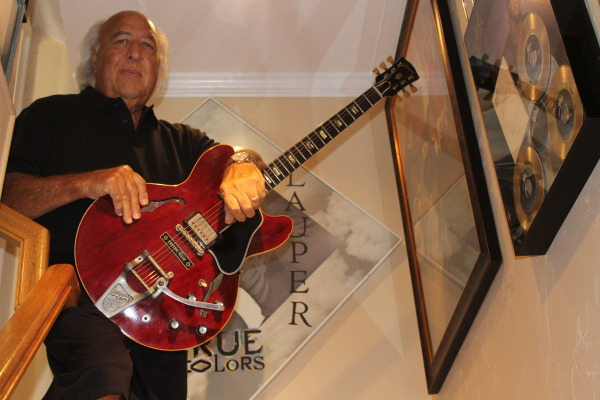

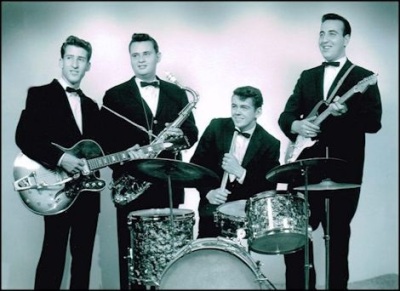
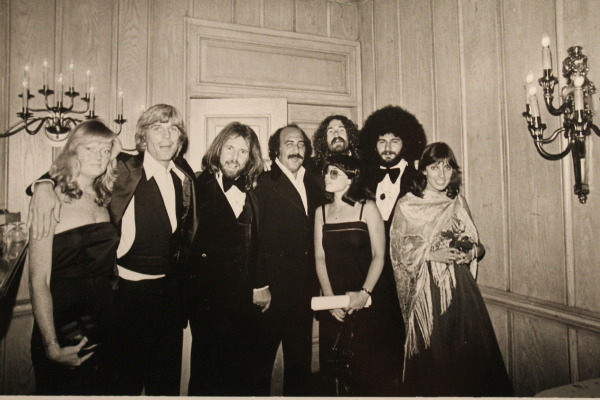
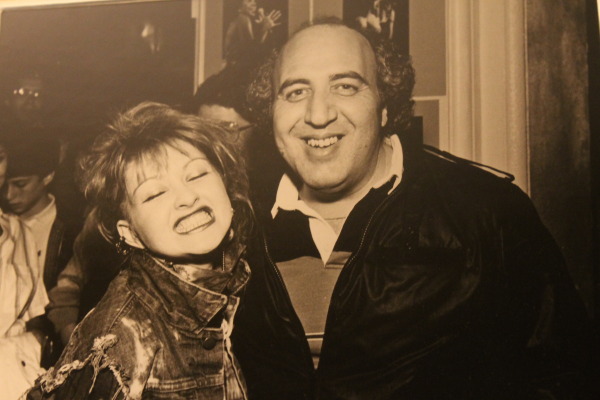
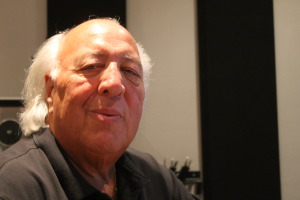






























Lennnie did very well in his life, with his success in the music business. In our past friendship, he was always a good man to get along with. I’m sure that with his likable personality, he has made a lot of long standing friends. I enjoyed reading this biography of his his early years in life,
along with his dedication, in working his way up to Vice President of CBS. He was fortunate to become successful in business, that he loved.
1. Jimmy Petze was a better guitarist!
2. Lennie was always a smart guy; so smart that he married Cecile Lavalle!
Stories, there are more over the hundred years we worked together. Lenny was/is a hard worker, hence the success. If we all put our heads together we could write Three Stooges funny stuff. We were like family in good times and bad.
Remember our brother Jimmy. We miss you. R I P……….
Really Interesting article. Lots of stuff I didn’t know about. I sure love reading about those old music days.
As a marketing guy at Epic, I had the great experience working with Lennie on many artists over the years. He was always excited to have me involved and even found the band that played at the wedding reception when I got married! Epic was an artist development machine throughout his career there, and he had a huge impact on that success.
I have wonderful memories of Lenny, Cici and the rest of the Petze clan and loved being with them on the Cape. Lenny surely was important to all these artists because of his talent and humanity.
Enjoy being in Lennie and Cecile’s company each year in Florida. As much FUN as those days I spent as a clown with Cole Bros. circus. Outstanding couple and an honor to know them. Fond regards!
Lennie,
Wow, tremendous! And STILL one of the nicest people in show business!!! Studio looks great!!! So proud to know you and Congratulations on being a legend! Much love!
Just a great piece on Lennie who I’ve known since we launched WRKO in Boston in 1967. When the station celebrated its 25th anniversary, Lennie, Lenny Collins and the late Walter Lee (all 3 at the time were promotion people and former musicians) played for us at the reunion. Lennie used to bring me music when I was program director at WRKO and many years later we both worked at Epic Records – Lennie did A&R and I did national promotion in New York. Lennie and I reconnected at an Epic reunion a few months ago. He is one of the nicest people I ever had the pleasure of knowing…
.
Bravo, Lennie!! A great article about a truly great “Record Man”!! His wonderful personality, friendly manner, great musical “tastes” and amazing “Ears” too, all made him the legend he is today!! He was always “there” for all his friends and Artists too! It was a joy working with him in Boston, when I was Capitol Record’s New England Radio Promo guy, following the also legendary, and mutual friend, Al Coury! Then again, no one could match his amazing energy, song sense and tenacity, other than Lennie! “Those Were The Days My Friend”!! Lennie Petze is the “Music Biz’s”, “Man for all Seasons”!
What a GREAT article!!! I didn’t want it to end!
I first met Lennie when he was with Ace Recording in Boston in the late 50’s and I was recording some original songs. Some became semi-hits on a small label in New England. We crossed paths many times over the years including performing at the WRKO reunion party previously mentioned by Mel Phillips. I worked with him at Transcontinental and on a Cape Cod live event with the re-constituted Righteous Brothers with Bobby Hatfield &Jimmy Walker of the Walker Brothers replacing Bill Medley. Lennie’s success over the years has been well deserved. He definitely had a “good ear”.
You are the king as far as I am concerned. Hope you are doing well.
Mike Uzzell
My father Humbert “Hap” Ventre had a distinguished career in NYC music studios, Radio City Music hall and with Paul Whitman’s Orchestra! I remember my father talking to my mother and I during dinner about his guitar student Lennie Petze’s innate ability as a guitar player! My father was Lennie’s first guitar teacher and inspired Lennie to work conscientiously to develop his potential! I was not aware of Lennie’s rich musical legacy. Two of my former music students are recording engineer/executives and I am sure they know of Lennie. Bravissimo Lennie! The Ventre family’s musical heritage is indeed impressive and i am blessed to be part of this cherished legacy. I conduct symphony orchestra concerts in America, Asia and Europe. Thank you for the eternal memory.
I still loVe YOU, Lenny, wanna’ hear some songs! (Ah hahahahah ha!!!!!😀🤣🙂😶🌙⚡️✨🧡
This is a wonderful piece on you. Congratulations!, really! Be Well. r🟠*